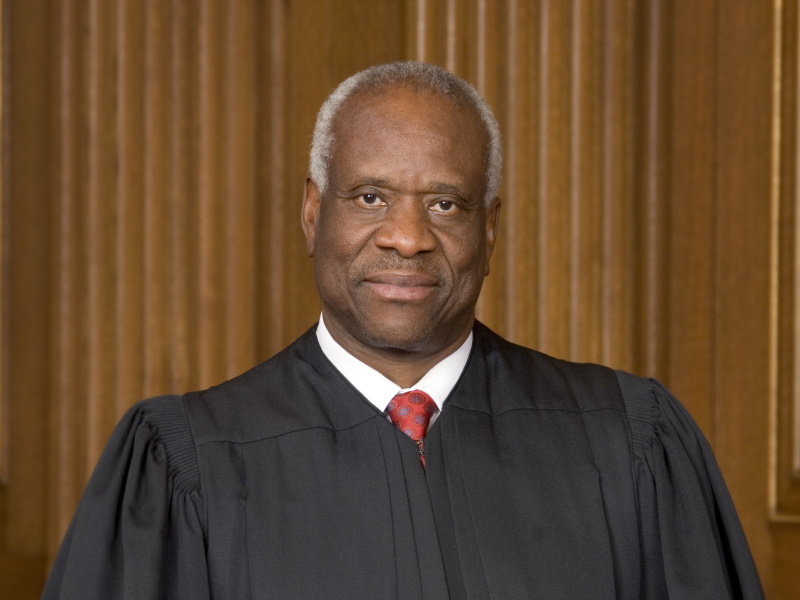Justice Thomas, Recusal And Wisconsin
U.S. and Wisconsin Supreme Court justices need not recuse no matter how flagrant the conflict of interest.
If he doesn’t resign, as U.S. Rep. Alexandria Ocasio-Cortez has properly asked him to, Justice Clarence Thomas at least needs to recuse himself from any cases dealing with the Jan. 6 uprising.
And he sure should have recused himself when he was the lone dissenter in a case earlier this year about the release of Donald Trump’s records relating to Jan. 6.
There’s absolutely no way Clarence Thomas can be a neutral arbiter in any future Jan. 6 cases.
Thomas’s flagrant conflict of interest reminds me that here in Wisconsin, we need better recusal rules for judges and justices, too.
This matter has come up several times over the last dozen years. First, the League of Women Voters of Wisconsin in 2010 petitioned the Wisconsin Supreme Court to tighten its recusal rules. Instead of doing so, the conservative justices on the court chose to accept a rule, written by Wisconsin Manufacturers and Commerce and the Wisconsin Realtors Association, which is essentially no rule at all. It says it’s totally up to the judge or justice whether to get off a case or not.
Then, in 2017, 54 retired judges in Wisconsin urged the Wisconsin Supreme Court again to tighten its recusal rules. The petition states: “As money in elections becomes more predominant, citizens rightfully ask whether justice is for sale. The appearance of partiality that large campaign donations cause strikes at the heart of the judicial function, which depends on the public’s respect for its judgments.”
The conservatives on the Wisconsin Supreme Court rejected this petition, as well. Justice Rebecca Bradley claimed that it was an offense to even imagine that judges could be so corrupted: “ Every judge in Wisconsin should be offended by this. It attacks their integrity and character,” she huffed.
Then-Justice Shirley Abrahamson rebutted this naïve claim: “Due process requires recusal if there is an actual conflict of interest or the appearance of a conflict of interest,” Abrahamson noted.
But to no avail.
So today in Wisconsin, just as on the U.S. Supreme Court, it’s up to the judge or justice to decide for himself or herself.
Things are so lax in Wisconsin that that if I’m a lawyer in a case before a judge, I can give a check for $2,000 to that judge’s reelection campaign while he’s sitting on my case, and neither I nor the judge needs to inform the lawyer on the other side.
That’s an invitation to legalized judicial corruption.
And unlike Rebecca Bradley, I wouldn’t be surprised if some judges accept the invitation.
Matt Rothschild is the executive director of the Wisconsin Democracy Campaign.
Op-Ed
-
Wisconsin Candidates Decry Money in Politics, Plan to Raise Tons of It
 Dec 15th, 2025 by Ruth Conniff
Dec 15th, 2025 by Ruth Conniff
-
Trump Left Contraceptives to Rot; Women Pay the Price
 Dec 8th, 2025 by Dr. Shefaali Sharma
Dec 8th, 2025 by Dr. Shefaali Sharma
-
Why the Common Council’s Amended Budget is Good Policy for Milwaukee
 Nov 20th, 2025 by Alds. Marina Dimitrijevic and Russell W. Stamper, II
Nov 20th, 2025 by Alds. Marina Dimitrijevic and Russell W. Stamper, II






















Matt, could you include links to the original documents, cases, or petitions you’re referring to? it really would be a great help to readers instead of the current links you’ve provided which only direct right back to a generic UM bio page.
ALL judges in Wisconsin are elected which means they ALL are raising money for their campaigns…. therefore do they ALL have a conflict of interest in every case they participate in?
What’s the solution?
Are there some examples of states that do it differently or better? Steer your readers to better solutions, solutions that have proven to be effective… and I’m being sincere. thank you.
*rant* – – Most journalism in the past 15 years has turned into “I hate Trump”, “I hate Obama”, blah blah blah… it’s lazy, period. And it’s useless (ie: not worth paying for) because there’s a million young grads with journalism degrees on YouTube & the net singing that same song for free.
The seasoned professionals with experience that haven’t already retired from the news industry could set an example and show the kids in the room how it should be done. *end of rant*
I think that there needs to be some standards for recusal even if it is not perfect. The current practice of Judges deciding for themselves is what the writer states is a opportunity for rampant conflicts of interest with no accountability. A good place to start out would be dollar limit on dollar contributions for judicial races.